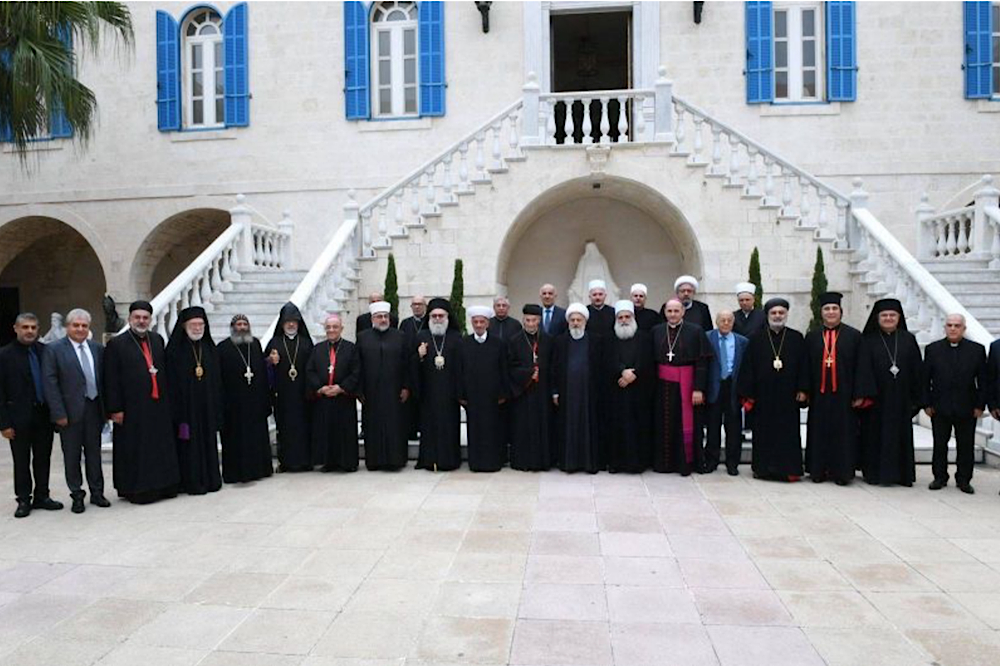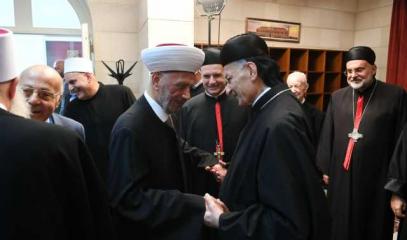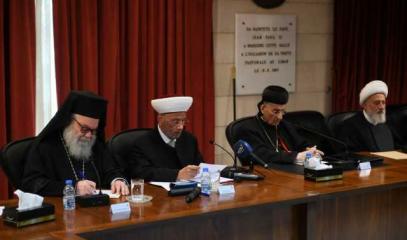Bkerké: Lebanese religious leaders call for peace (but with Shi'ite' distinctiveness)
In the headquarters of the Maronite Patriarchate, the main leaders of the 18 recognised religious communities in the country gathered. For Card. Raï it is ‘a sign of hope’. The urgency of a ceasefire, the election of a new president of the Republic who enjoys ‘consensus’, national unity and the Palestinian cause among the points of the final communiqué.
Beirut (AsiaNews) - The religious communities of Lebanon met yesterday in Bkerké, seat of the Maronite patriarchate, for an emergency general assembly in the presence of the apostolic nuncio Monsignor Paolo Borgia, representing the Holy See.
At the end of the meeting, the leaders of the various faiths appealed to the UN Security Council to ‘meet in a hurry to vote on a resolution imposing a ceasefire’ in the Land of the Cedars.
This call came as the Israeli Defence Minister, Yoav Gallant, once again dismissed the prospect of a truce with disdain, stating that any negotiations aimed at ending the fighting with Hezbollah must only be conducted ‘under fire’ (of weapons).
In front of an audience of about thirty personalities representing the 18 recognised religious communities in Lebanon, the following took turns to speak in the great hall of the patriarchal see: the Maronite Primate Card. Beshara Raï; the Mufti of the Republic, Abdel Latif Derian; the vice-president of the Shiite Higher Council, Ali el-Khatib; the Druze Sheikh Akl, Sami Abil-Mouna; the Greek Orthodox Patriarch Youhanna X Yazigi; and the head of the Alawite community, Ali Kaddour.
These parallel speeches converged on certain points considered fundamental, albeit with some distinctions that emerged in the speech delivered by the Shiite exponent: the urgency of a cease-fire, the absolute necessity of electing a president, the importance of national unity, the centrality of the State, the centrality of the Palestinian cause and respect for the Taif Agreement.
Patriarch Beshara Raï began his speech by welcoming those present and noting that the assembly should represent ‘a sign of hope’ for the Lebanese. Particularly in a historical phase in which social relations characterised by tensions ‘are in danger of crumbling’ due to the path taken by the internal crisis and the blocking of institutions.
In essence, the head of the Maronite Church urged all parties to postpone settling internal political scores until later and, instead, to focus their speeches and efforts on ‘strengthening the sense of belonging of all communities in Lebanon’.
The only dissonance with this watchword came from the Shiite side: Sheikh Ali el-Khatib gave an ambiguous speech, in which he hailed the resistance and justified its existence on the grounds that ‘it is the state that has abandoned its sovereignty for decades and proved incapable of defending its people (...)’. The vice-president of the Shiite High Council also called for the election of a ‘consensual’ president, a term that is problematic in the Land of the Cedars, where it is synonymous with political accommodation and agreements that are incompatible with sovereignty.
Through this speech, it became clear how the Shia community continues to want to give legitimacy to a resistance parallel to the Lebanese armed forces [initiated and nurtured by Hezbollah] and outside its command. This is the same entity that plunged Lebanon into the current crisis by unilaterally deciding on 8 October 2023, the day after Hamas launched Operation Al-Aqsa Flood, to support the fighting in Gaza with a ‘low-intensity’ war.
It should be noted that the Jafarite mufti Ahmad Kabalan, Hezbollah's unofficial spokesman and potential successor to Sheikh Ali el-Khatib, was part of the delegation of the Shia Supreme Council that spoke in Bkerké. In his opening speech, Druze Sheikh Akl quoted St John Paul II. ‘What about Lebanon as a message?’ he exclaimed, referring to a proposal in which Pope Wojtyla described the country of the cedars as “a model of pluralism for the East and the West”. This phrase, which includes the key concept of pluralism and which appeared in the preparatory draft of the final communiqué, was omitted by him in the final and final draft.
Full implementation of resolution 1701
After the speeches, the summit called for ‘the full implementation of resolution 1701, particularly with regard to support for the army and its deployment south of the Litani river’. It also called for ‘the immediate election of a president in accordance with the provisions of the Constitution, who enjoys the confidence of all Lebanese, the widest understanding and the greatest consensus’.
While thanking the communities that have welcomed the displaced, the communiqué emphasised ‘respect for individual property and rejects any form of encroachment on it’. Finally, the participants in the interfaith meeting thanked ‘Arab and foreign countries [...] for their political support and material, medical and food aid’ and called for their assistance in rebuilding what continues to be systematically destroyed by the Israeli army. The communiqué concludes with a call for peace, recalling that the Palestinian cause is the central cause of the entire Arab world.







.jpeg)


.png)










